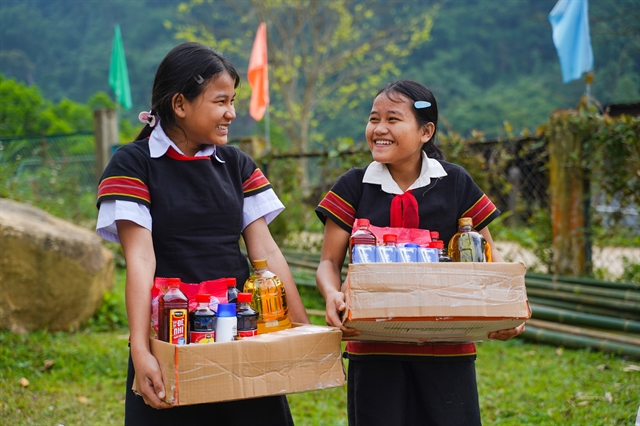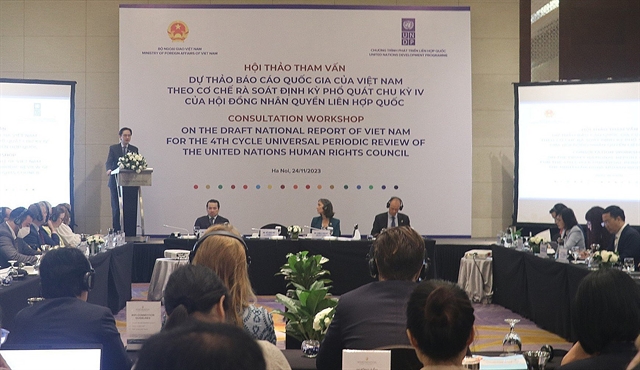 Politics & Law
Politics & Law

 |
| Đỗ Hùng Việt, Deputy Minister of Foreign Affairs of Việt Nam, speaks at the workshop. He said Việt Nam had spared no effort in implementing the recommendations it received in the 3rd Cycle. VNA/VNS Photo Nguyễn Hoa |
HÀ NỘI — In the 3rd Cycle Universal Periodic Review (UPR) of the United Nations Human Rights Council, Việt Nam fully supported 220 out of 291 recommendations it received, increasing by 13 per cent from the 2nd Cycle.
That was the remark made by Ramla Khalidi in her role as UN Resident Coordinator a.i. in Việt Nam, in the consultation workshop on the country's draft national report for the 4th Cycle on Friday.
She said the UPR process was not a one-time review event. It called for commitments to go beyond mere reporting and actively engage in implementing UPR recommendations.
The commitments include all international human rights obligations such as Treaty Bodies and Special Procedures, and those embedded in the 2030 Agenda for Sustainable Development.
She also said that in the 3rd Cycle, Việt Nam's 2019 National Master Plan played a key role in the implementation of accepted recommendations. She hoped the government would continue the good practice by creating a National Master Plan for the 4th Cycle.
"I look forward to seeing Việt Nam continuing to demonstrate its leadership in the protection and promotion of human rights both at home and at the global level," said Ramla Khalidi.
Đỗ Hùng Việt, Deputy Minister of Foreign Affairs of Việt Nam, said that over the past four years, Việt Nam had spared no effort in implementing the recommendations it received in the 3rd Cycle.
By October 2023, the country had fully implemented 209 out of the 241 recommendations (86.7 per cent). The implementation of 30 was ongoing whereas the remaining two required further consideration on timing for implementation.
He took the country's achievements in poverty reduction as an example to illustrate how well it had implemented the recommendations on poverty. One of the achievements was the recognition of Việt Nam as being among 25 countries to successfully halve their global multidimensional poverty index (MPI) within 15 years in the latest MPI update.
"In his visit to Việt Nam earlier this month, the Special Rapporteur on the Right to Development remarked that Việt Nam, despite being hard-hit by the COVID-19 pandemic and the impact of global conflicts, had made great strides in multidimensional poverty reduction," said Việt.
Patrick Haverman, UNDP Deputy Resident Representative in Việt Nam, presented several comments on the national draft report.
The first comment was on its structure, which he recommended considering the grouping of the rights and issues according to the OHCHR guidelines to avoid gaps. He also recommended clearly linking the content of the recommendations with the achievements noted in the report.
Regarding its content, he said it could be useful to strengthen the linkages between results achieved and back them with solid data and evidence. References to reputable sources could be consolidated to support several statements of the progress made throughout the draft.
His next recommendation was that Việt Nam use the SDG framework to structure the recommendations along thematic areas and measure the progress according to the SDG indicators.
"Việt Nam can promote good practising standards in the development of the state report, and during its participation in the review session in Geneva in May next year," said Patrick Haverman.
He also said Việt Nam should consider the report as an opportunity to showcase its progress towards voluntary pledges as a council member and to explore the advances that had been made towards the 50 recommendations from the 3rd Cycle which were noted and not accepted. — VNS